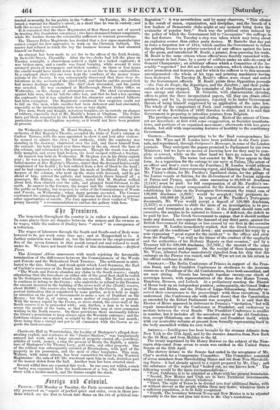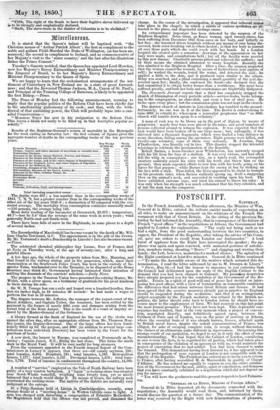furrigu
• FRANCE.—Till Monday or Tuesday, the Paris accounts stated that the city preserved an "aspect of perfect quiet and order, even in those por- tions which are the first to break into flame on the eve of political con- ftagration." : it was nevertheless said by many observers " This silence is the result of union, organization, and discipline, and.the breath of a few leaders of Democratic clubs might at any moment bring down the avalanche of popular fury." Such was the political crisis induced by- the policy of which the Government bill to ".reorganize" the suffrage in the last feature. On Tuesday a step was taken which may bring about an explosion sooner than either party desires. M. Bareche that day put in force a forgotten law of 1814, which enables the Government to refuse the printing licence to a printer convicted of any offence against the laws of the press, and interdicted M. Houle, a printer, from pursuing his trade.. M. Houle is the same citizen whose offices:were forcibly ransacked with- out warrant in last June, by a party of soldiers under an aide-de-camp Of General Changarnier ; an arbitrary offence which a Committee of the As- sembly "regretted" but did not further condemn which obtained for the actor promotion and honours, and for which the sufferer is to this moment uncompensated—the whole of his type and printing machinery having been destroyed. On Tuesday M. Houle's offices were closed and sealed by the Government officials. M. Houle, prints three Opposition journals —the Voix du Peuple, the Republique and the Eslafette ; and their publi- cation is of course stopped_ The remiinder of the Republican press is at once savage and alarmed. M. Girardin, with characteristic chivalry, offers to print the three incapacitated papers till they can obtain other printers ; and he is, in consequence, reported to lie under Government threats of being himself suppressed by an application of the same law„ The whole of the compositors of Paris (and compositors were the prime movers of the Revolution of 1830) threaten to strike and it is said that Government is preparing to introduce printers from Velgiiim.
The provinces are fermenting and chafing. Riots of the miners of Cren- sot arc described ; at first with some exaggeration, as Socialist manifesta- tions, and portions of an organized movement ; afterwards with less grave details, but still with unpromising features of hostility to the reactionary Government.
GREECE.—Documents purporting to be the final correspondence be- tween Mr. Wyse and M. Londos have been published in the Paris jour- nals, and reproduced, through Galignani's Messenger, in some of the London- journals. They anticipate the papers promised to Parliament by our own: Ministers ; but we have no means of knowing how far they may be com- plete or correett while on the other hand we have no reason to doubt their authenticity. The terms last exacted by Mr. Wyse appear in this form. As a reparation for the outrage to 'our navy at Patras, [the arrest of an officer and boat's crew from the FantOme,j M. Londos would address, Mr. Wyse an 'efficial letter expressing regret, And blaming the officials. For Mr. Finlay's claim, for Mr. Pacifieo's liquidated claim, for the pillage of the Ionian vessels at Salcina, for the ill-treatment of the Ionian subjects- at Patras and Pyrgos, specific sums amounting to 60,068'49 drachmas (2,1431.) must be paid : for full compensation of all Mr. Pacifico's un- liquidated claims, except compensation for the destruction of documents establishing his claim on the Portuguese Government, the round sum oL 120,000 drachmas (4,2851.) would be accepted ; total payments. de- manded, 180,068-49 (6,428/.) In respect of Mr. Pacifico's Portuguese documents, Mr. Wyse would accept a deposit of 150,000 drachmae, (5,3570 as a guarantee to abide the issue of an investigation to be pro, scented and terminated in a given time : if the deposit should turn out excessive, the surplus to be restored to Greece ; if deficient, the deficit to be paid by her. The Greek Government to engage that it should neither make any demand, nor support the demand of any third party, against the British Government for damage or loss caused by our fleet in the coercive measures. M. Londos immediately replied,- that the Greek Government•"accepts all the conditions" laid down ; and accompanied his reply by a
note expressing "great regret for the incident" to the officer and crew from the FantOme, "as well as the blame of the conduct of the employes and the authorities of his Hellenic Majesty on that occasion," and by a Treasury bill for 330,068 drachmas, (11,785/.0 the amount of the sums claimed as payment and deposit. On the receipt of these documents by Mr. Wyse, Admiral Parker immediately signalled from his ship that the embargo on the Pirieu.s was raised, and Mr. Wyse set out on his return to his official residence in Athens.
GERAIANY.—The Berlin Conference of Princes in support of the Pres- -Bien Bund, and the Frankfort Conference in obedience to the Austrian summons as Presidium of the old Confederation, have both assembled, an are now sitting. Prussia has brought together twenty-one chiefs of sovereign houses, with representatives of the three free Hansa Towns Hamburg, Bremen, and Lubeck. At a preliminary meeting the Elector of Hesse took up an independent position ; subsequently, the Grand Dukes of Hesse and Baden, and the Prince of Lippe-Schaumberg, formally re- served their concurrence to the proceedings : with these exceptions, it is understood (the Conference sits with closed doors) that the Constitution as amended by the Erfurt Parliament was accepted. It is said that the Elector of Hesse appeared in deference to Prussia's" invitation," but will repair immediately to the Conference at Frankfort, and endeavour to mediate between the rival Bunds. The Frankfort Conference is smaller in number, but it includes all the secondary dates of the old Confedera- tion except Oldenburg, one of the smallest, and Frankfort itself; which with coy neutrality refrains at present from formally representing itself in the body assembled within its own walls.
AMERICA.—Intelligence has been brought by the steamer Atlantic from New York to the 27th April, and by the steamer America from New York to the 2d May, and from Halifax to the ad.
The treaty negotiated by Sir Henry Bulwer on the subject of the Nica- ragua ship-canal from ocean to ocean was ratified in the United States Senate on the 24th April.
The slavery debate in the Senate had ended in the acceptance of Mr. Clay's motion for a Compromise Committee. The Committee consisted of seven members from Slaveholding States and six. from Non-Slavehold- ing States : it had already agreed to a report prepared by Mr. Clay; anti the stibstance of the report had "leaked out, no one knows how.' The following would be the main recommendations- " First, California is to be admitted as a State with her present boundaries. "Second, New Mexico and Utah are to have Territorial Governments, without any reference to slavery whatever. "Third, The right of Texas to be divided into four additional States, with or without slavery as the people within them may desire, whenever there is a sufficient population, is to be fully recognized. "Fourth, The boundary between Texas and New Mexico is to be adjusted agreeably to the line and plan laid down in Mr. Clay's resolutions.
"Fifth, The right of the South to have their fugitive slaves'delivered up is to be strongly and emphatically declared.
"Sixth, The slave-trade in the district of Columbia is to be abolished."



























 Previous page
Previous page